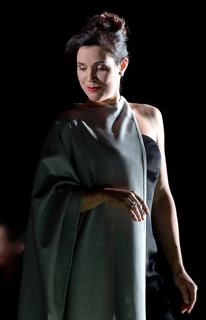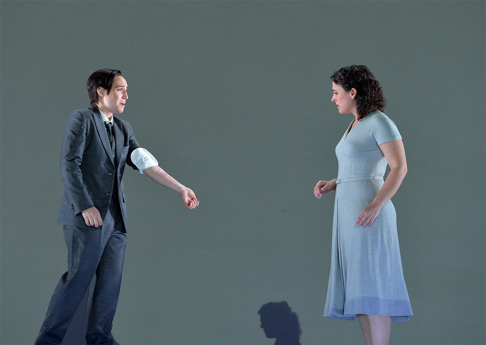
07 Jan 2015
Idomeneo in Montpellier
Vestiges of a momentous era . . .
English Touring Opera are delighted to announce a season of lyric monodramas to tour nationally from October to December. The season features music for solo singer and piano by Argento, Britten, Tippett and Shostakovich with a bold and inventive approach to making opera during social distancing.
This tenth of ten Live from London concerts was in fact a recorded live performance from California. It was no less enjoyable for that, and it was also uplifting to learn that this wasn’t in fact the ‘last’ LfL event that we will be able to enjoy, courtesy of VOCES8 and their fellow vocal ensembles (more below …).
Ever since Wigmore Hall announced their superb series of autumn concerts, all streamed live and available free of charge, I’d been looking forward to this song recital by Ian Bostridge and Imogen Cooper.
The Sixteen continues its exploration of Henry Purcell’s Welcome Songs for Charles II. As with Robert King’s pioneering Purcell series begun over thirty years ago for Hyperion, Harry Christophers is recording two Welcome Songs per disc.
Although Stile Antico’s programme article for their Live from London recital introduced their selection from the many treasures of the English Renaissance in the context of the theological debates and upheavals of the Tudor and Elizabethan years, their performance was more evocative of private chamber music than of public liturgy.
In February this year, Albanian soprano Ermonela Jaho made a highly lauded debut recital at Wigmore Hall - a concert which both celebrated Opera Rara’s 50th anniversary and honoured the career of the Italian soprano Rosina Storchio (1872-1945), the star of verismo who created the title roles in Leoncavallo’s La bohème and Zazà, Mascagni’s Lodoletta and Puccini’s Madama Butterfly.
Evidently, face masks don’t stifle appreciative “Bravo!”s. And, reducing audience numbers doesn’t lower the volume of such acclamations. For, the audience at Wigmore Hall gave soprano Elizabeth Llewellyn and pianist Simon Lepper a greatly deserved warm reception and hearty response following this lunchtime recital of late-Romantic song.
Collapsology. Or, perhaps we should use the French word ‘Collapsologie’ because this is a transdisciplinary idea pretty much advocated by a series of French theorists - and apparently, mostly French theorists. It in essence focuses on the imminent collapse of modern society and all its layers - a series of escalating crises on a global scale: environmental, economic, geopolitical, governmental; the list is extensive.
For this week’s Live from London vocal recital we moved from the home of VOCES8, St Anne and St Agnes in the City of London, to Kings Place, where The Sixteen - who have been associate artists at the venue for some time - presented a programme of music and words bound together by the theme of ‘reflection’.
'Such is your divine Disposation that both you excellently understand, and royally entertaine the Exercise of Musicke.’
Amongst an avalanche of new Mahler recordings appearing at the moment (Das Lied von der Erde seems to be the most favoured, with three) this 1991 Mahler Second from the 2nd Kassel MahlerFest is one of the more interesting releases.
‘And there was war in heaven: Michael and his angels fought against the dragon; and the dragon fought and his angels, And prevailed not; neither was their place found any more in heaven … that old serpent … Satan, which deceiveth the whole world: he was cast out into the earth, and his angels were cast out with him.’
If there is one myth, it seems believed by some people today, that probably needs shattering it is that post-war recordings or performances of Wagner operas were always of exceptional quality. This 1949 Hamburg Tristan und Isolde is one of those recordings - though quite who is to blame for its many problems takes quite some unearthing.
There was never any doubt that the fifth of the twelve Met Stars Live in Concert broadcasts was going to be a palpably intense and vivid event, as well as a musically stunning and theatrically enervating experience.
‘Love’ was the theme for this Live from London performance by Apollo5. Given the complexity and diversity of that human emotion, and Apollo5’s reputation for versatility and diverse repertoire, ranging from Renaissance choral music to jazz, from contemporary classical works to popular song, it was no surprise that their programme spanned 500 years and several musical styles.
The Academy of St Martin in the Fields have titled their autumn series of eight concerts - which are taking place at 5pm and 7.30pm on two Saturdays each month at their home venue in Trafalgar Square, and being filmed for streaming the following Thursday - ‘re:connect’.
The London Symphony Orchestra opened their Autumn 2020 season with a homage to Oliver Knussen, who died at the age of 66 in July 2018. The programme traced a national musical lineage through the twentieth century, from Britten to Knussen, on to Mark-Anthony Turnage, and entwining the LSO and Rattle too.
With the Live from London digital vocal festival entering the second half of the series, the festival’s host, VOCES8, returned to their home at St Annes and St Agnes in the City of London to present a sequence of ‘Choral Dances’ - vocal music inspired by dance, embracing diverse genres from the Renaissance madrigal to swing jazz.
Just a few unison string wriggles from the opening of Mozart’s overture to Le nozze di Figaro are enough to make any opera-lover perch on the edge of their seat, in excited anticipation of the drama in music to come, so there could be no other curtain-raiser for this Gala Concert at the Royal Opera House, the latest instalment from ‘their House’ to ‘our houses’.
"Before the ending of the day, creator of all things, we pray that, with your accustomed mercy, you may watch over us."

Vestiges of a momentous era . . .
A legacy of ousted Montpellier general director Jean Paul Scarpitta, the staging of Mozart’s first operatic masterpiece remained entrusted to Scarpitta’s assistant Jean-Yves Courrégelongue. Both Scarpitta and Courrégelongue are stage directors whose artistic formations were with Robert Wilson. Both have developed strongly individual voices, Wilsonesque only in so much as they both cultivate an extreme minimalism. Of these two Montpellier directors Courrégelongue is more imagistic, Scarpitta is more satiric.
Courrégelongue and his designer Mathieu Lorryy-Dupuy used a chair, a curtain, a table and a swimming pool to bring alive Mozart’s tale of sacrifice. This was not to update an ancient story’s Baroque retelling so much as it was to purge a Mozart masterpiece of extraneous, misleading detail (the trappings of an anachronistic opera seria for example) and to make it what it is — a dramatic action in music, and nothing more.
And yes, there was still the spectacle that is so strikingly created in Mozart’s score. It was squarely minimalist where less is more — an all the more terrifying appearance of the beast of the deep in the symbolic form of a sacrificial table exploding in white light. High tension had already been created in the blackouts that exploded into the sudden appearances of Idomeneo and later the crowds of terrified Cretans.
Courrégelongue hit sacrifice hard, depriving the opera of its obligatory happy ending. Elettra not only longed for death, she sacrificed herself to the love of Ilia and Idamante holding the sacrificial knife and disappearing through the crowd into swimming pool.
At last the gods having been appeased and the crowd having cleared the pool of detritus (plastic bags, old tires, etc.) deposited by the storms, Elettra’s body, victim of the opera’s emotional storms, was retrieved and laid out to Mozart’s orchestral epilogue. The sacrifice we had fought all evening had become real, it was a sacrifice more real to us than the averted opéra seria mythological filicide. And it was pure Mozart.
In Idomeneo the young Mozart had made an immensely powerful opéra seria, and here we discovered a hidden depth of humanity to surprisingly illuminate this masterpiece. It was fully realized musically in Montpellier by French conductor Sébastien Rouland whose considerable career seems to be centered in big house productions of Baroque repertory (contemporary perspectives, not historical re-creations).
Mo. Roulard brings bite and high drama to Mozart, suppressing the neo-classicism (balance of tension and relaxation) that informs the symphonic Mozart and his soon-to-come comedies. The appropriate (reduced) forces from the Orchestre National de Montpellier eagerly responded to the maestro’s demand for edgy tone and sharply defined shapes. The orchestra melted into transparent pianissimos for the prayer of Idomeneo creating transcendent musical magic, then roared with frustration in Electra’s final aria. Rare sonorities of orchestration sang out, most notably the fine horn quartet.
 Anna Manske as Idamante, Marion Tassou as Ilia
Anna Manske as Idamante, Marion Tassou as Ilia
Mo. Roulard’s tempi were at once dramatically pointed and solidly within reach of the young cast. The three women were well matched in vocal color and accomplishment. Ilia was sung by French soprano Marion Tassou with beguiling purity of tone, Idamante was sung by Austrian mezzo Anna Manske who found a charming male/female compromise, and Elettra was sung by Swiss soprano Clémence Tilquin who raged with conviction in her aria begging for death. Robert Wilson costumer Yashi (single name) provided a simple dress for Illia, a shapely male business suit for Adamante and a slinky pants suit for Elettra, simple attire that spoke volumes about character.
The male voices were under par for a Montpellier Mozart opera, all over-parted, i.e. either unable to fulfill Mozart’s vocal demands or too inexperienced to be convincing, or both. An announcement was made that American tenor Brendan Tuohy as Idomeneo was “soufrant” and would not be at his best. While an appropriately imposing figure as Idomeneo his lack of experience to take on a major role on an important stage was glaring.
Michael Milenski
Casts and production information:
Idomeneo: Brendan Tuohy; Ilia: Marion Tassou; Idamante: Anna Manske; Elettra: Clémence Tilquin; Arbace: Antonio Figueroa; Nepture priest: Nikola Todorovitch; Neptune: Jean-vincent Blot. Chorus and orchestra of the Opéra Orchestre national Montpellier. Conductor: Sébastion Rouland; Mise en scène: Jean-Yves Courrégelongue; Scenery: Matthieu Lorry-Dupuy; Costumes: Yashi; Lighting: John Torres. Opéra Commedie, Montpellier. January 4, 2015.